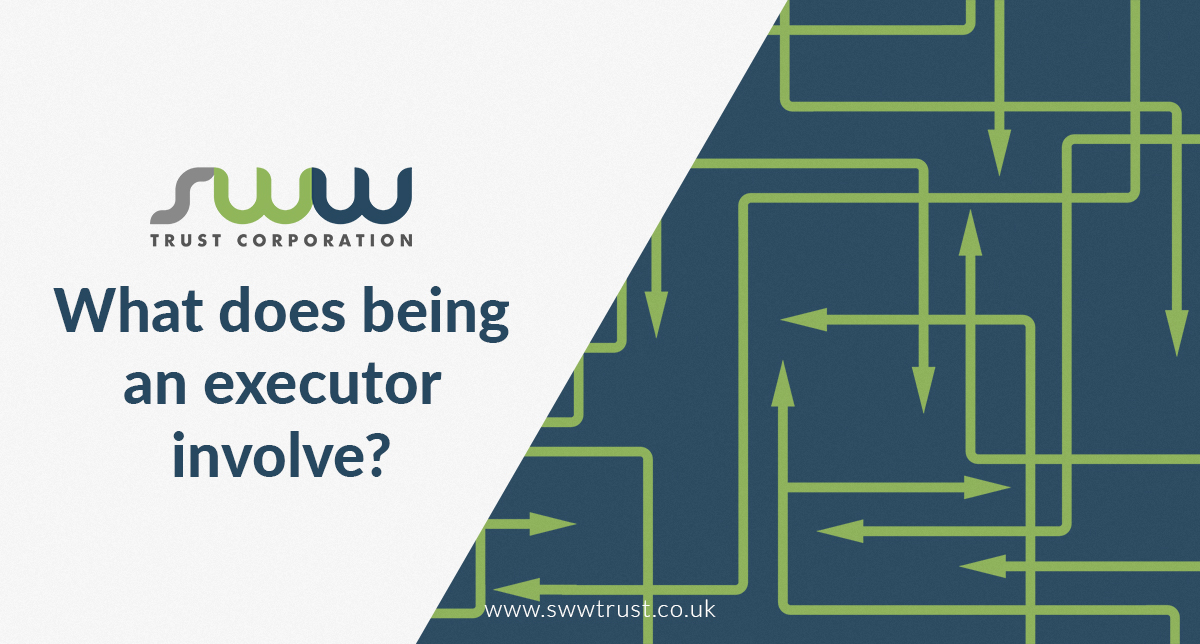Latest News
Latest News

For us here at SWW Trust Corporation, the probate process is one which we understand and deal with daily. However, for a grief-stricken individual, the death of a loved one is difficult enough without having to worry about what needs to be done now that they’re gone. If you are asking questions along the lines of “what do I need to do when someone dies?”, perhaps you find yourself appointed as an executor in a Will, or you are writing your Will and trying to decide who to appoint.
Taking a quick look at what you do need to do when someone dies, an executor has several duties and responsibilities. These range from identifying all the assets and liabilities held by the deceased to applying for probate, settling debts, and distributing their estate to the beneficiaries.
Let’s explore the probate process in a little more detail.
Firstly, you should obtain a death certificate and the original Will as you may find it contains directions for funeral arrangements, which typically take priority. You should then set about gathering all the financial information you need to complete the relevant Inheritance Tax (IHT) forms. This involves contacting banks and other companies to determine assets such as savings, investments, pensions, and life assurance policies. You will also have to gather information on any of the deceased’s debts and liabilities, as well as any gifts made, or debts forgiven in the last 7 years. There may also be property to be dealt with, in which case valuations for these should be obtained too.
Once you’ve collected all the asset and liability details, there are forms to be completed to apply for a grant of probate. This may include forms for IHT, forms for personal applications as well as an Executors Oath which will need to be sworn by a solicitor or commissioner for oaths along with the original Will. Once the relevant documents are completed, they must then be submitted to the Probate Registry or taken to the local Probate Registry to be submitted if making a personal application.
After the grant of probate has been issued, you must collect all the liquid assets, arrange for any sales or transfer of property/assets, and settle any debts. s27 Statutory Notice to Claimants should be placed, tax affairs including IHT and Capital Gains Tax should be settled as well as any specific/pecuniary legacies in the Will. Draft estate accounts for the residuary beneficiaries need to be prepared before finally distributing the estate to the beneficiaries.
Being an executor is a demanding role and can prove to be both time-consuming and stressful, with the probate for even the most modest of estates sometimes taking upwards of a year to complete. Estates can also become contentious, which can hold up the process where executors can’t agree, or beneficiaries argue. There are also risks associated with the role, and if not careful it can be easy to make mistakes. Common mistakes include not disclosing relevant assets or liabilities on tax forms, allowing interest to accrue unnecessarily on unpaid IHT or even failing to insure and maintain vacant properties. As an executor, you could be held personally liable for mistakes, and in extreme cases even receive penalties and be prosecuted for fraud.
Naturally, many people are reluctant to take on the role of acting as an executor and choose to step down. Whilst you are free to do so, it must be done at the very beginning as any action you take as executor, even something as small as paying a utility bill, can result in what’s called intermeddling. If determined to have intermeddled, by law you will be prohibited from standing down and you must fulfil your duty, again leaving you liable for your actions.
If being an executor is not something you are comfortable doing, or you are writing your Will and you think it best to appoint a professional from the outset instead, SWW Trust Corporation is here to help. By trusting us to act as a professional executor, you will be relieved of all the stress and burden as our experienced team will take care of probate for you. Every case is assigned to a dedicated estate manager who will handle everything from start to finish, keeping you updated every step of the way. We operate on either a low percentage or fixed-cost basis according to estate value and can either be written into the Will as a professional executor or appointed at the time of need.
For more information and to access our services, get in touch with us today and we’ll be more than happy to help.